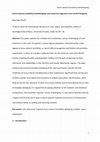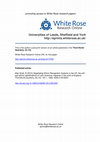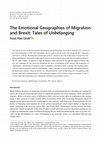Papers by Rosa Mas Giralt
Documents d'Anàlisi Geogràfica
Index de les obres ressenyades: Kathrin HÖRSCHELMANN i Rachel COLLS, Contested bodies of childhoo... more Index de les obres ressenyades: Kathrin HÖRSCHELMANN i Rachel COLLS, Contested bodies of childhood and yout

Bibl iogra phy 281 APPENDIX A: Interview schedule-Adult participants (English version) 317 APPEND... more Bibl iogra phy 281 APPENDIX A: Interview schedule-Adult participants (English version) 317 APPENDIX B: Instructions for diagram activities and interview schedules-Young participants (English versions) 319 APPENDIX C: Group interview with biographical object-Interview schedule (English version) 325 APPENDIX D: Original Spanish quotations 327 APPENDIX E: Project information sheets and consent forms (English versions) 'self-identification' from a grassroots perspective has also been challenged by the development of other collective terms such as 'Indo America' or 'Afro America', rooted in political movements aimed at recognizing Indigenous and African peoples (e.g. Eakin 2007; Meade 2010; Mignolo 2005). These debates are extremely complex and are also entangled with those surrounding 'panethnic' identifications such as Latino or Hispanic, which have found expression amongst Latin American migrant populations and their descendants (e.g. Gracia 2000, see also chapter 4). Notwithstanding this, for the object of the present thesis, it is important to note that many scholars and other intellectuals concur that a sense of Latin American identity (multiply defined and contested) has continued to exist visa -vis national identities and other collective affiliations across this vast and heterogeneous
Cartographies of Differences

Family Practices in Migration, 2021
This concluding chapter enhances the overall contributions of the edited collection and shows the... more This concluding chapter enhances the overall contributions of the edited collection and shows the benefits of conceptualising migrant individuality as built through relational and everyday processes with others as well as within the structures, timings and spaces that mediate migrant social life. Highlighted are conceptual insights to understand migrant families in their fluidity and dynamism, the continuum of personal relationships in the lives of adult and young family members beyond normative configurations, and the emotional labour, with positive or negative motivations and outcomes, of doing family in migration. Significant in these insights are the contributors’ notions of ‘illegality’ in childhood, second generation return migration, home orbit and relational nationality. Next, promising research approaches and relational spaces for accessing the lives of migrant families are discussed. These include narrative research and storytelling, visual methods and composite case studies, virtual spaces (ICTs) and embodied practices (dance, sport). Also accentuated are ethical challenges when studying migrant family and personal relations with reflexivity and positionality as core concerns for the contributors in this volume. The chapter concludes by mapping out future research venues in relation to intersectionality, LGTBQ++ families and global forced migration that will enrich scholarship on migrant families.
Children's Geographies, 2018
This exploratory article aims to contribute to scholarship on migrants’ experiences of bereavemen... more This exploratory article aims to contribute to scholarship on migrants’ experiences of bereavement and grief through the loss of a parent in their country of origin. It considers how transnational ...

Identities and Subjectivities, 2015
In order to recognize young people as independent social agents, a great deal of research has foc... more In order to recognize young people as independent social agents, a great deal of research has focused on developing understandings of their senses of identity and belonging outside of the realm of the family. As relevant and necessary as these contributions are, they do not allow for an exploration of the role that relationships within the family or across generations may play in young people’s sense of self. Taking into account the relational context of the family is necessary to develop better understandings of the experiences and affiliations of children of migrant descent who may live embedded in transnational families and their extended social networks. The chapter starts by exploring the research which has foregrounded the roles of children and young people in processes of transmigration and incorporation into receiving societies, illuminating the ways in which they actively negotiate experiences of inclusion and exclusion. It then considers the contributions made by research on transnational families and emotional and symbolic transnationalism that aid our understanding of the cross-border connections of later generation young people. These contributions highlight the relevant roles that transnational family networks and their emotional circuits play in recreating attachments which may figure saliently in the senses of self of young children of migrants. Paying attention to the roles that emotional and symbolic transnational attachments play in the senses of identity and belonging of children of migrant descent can enrich conceptualizations of transnationalism and contribute to understandings of children’s emotional and imaginative agency.

Emotion, Space and Society, 2015
This paper explores the multiple and simultaneous senses of belonging of Latin Americans in the n... more This paper explores the multiple and simultaneous senses of belonging of Latin Americans in the north of England, a sparse migrant population characterised by a high degree of socio-cultural invisibility, i.e. lack of official recognition and limited cultural/ethnic organisation. It draws on a project conducted with 10 Latin American and Latino British families (totalling 30 adults and dependent children of 8-18 years of age) and 14 other informants and stakeholders in the Yorkshire and Greater Manchester regions. The paper analyses the senses of everyday belonging of the adult participants and the role that conditions of socio-cultural invisibility play in their experiences. Significant here are the lack of ethno-cultural local spaces and reluctance to embrace pan-ethnic identifications, which bring to the fore the relevance of other local social contexts and of transnational ties as sites of everyday belonging. It is argued that by paying attention to the emotions and emotional compromises that constitute migrants' senses of belonging, it is possible to develop nuanced insights into the diversity of ways in which migrants experience processes of incorporation and combine bonds to sending and receiving societies.

Third World Quarterly, 2013
Despite aiming to provide minority ethnic groups with material equality and protection from discr... more Despite aiming to provide minority ethnic groups with material equality and protection from discrimination, the British ethno-cultural system of recognition has perpetuated social differentiation which is difficult to transcend. Drawing from interviews with informants and ten in-depth case studies with Latin American and Latino-British families in the Yorkshire and Greater Manchester regions of the north of England, the paper explores the fraught relationship between these migrants and their multicultural framework of incorporation. Significant here are the contested understandings of the Latin American collective identity combined with the diversity of migration trajectories, socioeconomic backgrounds, and life course needs of migrants and their children which contribute to soft panethnic identifications among the participant population. It is argued that by encouraging migrants and their descendants to seek recognition through absolute ethnic differences, multicultural recognition systems can reproduce colonial categories and fail to respond to the diverse social and life course needs of migrants.

Cross-Border Migration among Latin Americans
The South American population living in the UK and Europe has grown decisively over the past deca... more The South American population living in the UK and Europe has grown decisively over the past decade (Foreign and Commonwealth Office 2007, McIlwaine 2007).1 With an increasing number of economic migrants, students, and family reunifiers supplementing the earlier flows of those moving to seek asylum and to participate in skilled labor markets, the community has greatly diversified. The fact that, like many immigrant populations, South Americans tend to concentrate in some areas and not others introduces further diversity between, in the UK, the South American communities in London and the North. Understanding how growing immigration and diverse communities affects British, European, and South American societies in interdependent ways is important to debates on citizenship, belonging, and multiculturalism (Yuval-Davis 2006), development and position of South America in the global economy (Munck 2009, Robinson 2004), and convergence and divergence across Europe (Koser and Lutz 1998; Pellegrino 2004).
Cross-Border Migration among Latin Americans

Population, Space and Place, 2016
Research has highlighted that increasing numbers of third-country migrants who have acquired Euro... more Research has highlighted that increasing numbers of third-country migrants who have acquired European Union (EU) citizenship in one EU Member State employ the freedom of movement that it provides to onward migrate to other EU destinations. A range of socio-economic, cultural, and educational factors have been found to drive migrants to move onward to try to fulfil their migration aspirations across multiple locations. This paper suggests that analysing onward migration through the relational lens proposed by the mobility paradigm better acknowledges the processual and dynamic nature of this migration pattern and its motivations. Drawing from a small-scale project focusing on Latin American migrants (with EU citizenship) who have relocated from Spain to the UK post-2008, the paper presents a distinctive form of reactive onward migration. Research is based on secondary data analysis and semi-structured interviews with key informants from voluntary and statutory organisations in Spain and the UK. It finds that, as their socio-economic conditions deteriorate in Spain, some Latin Americans decide to mobilise their civic and social capital (EU citizenship, transnational networks) to move to the UK in search of employment. Yet, the full mobilisation of this civic capital is jeopardised by their limited linguistic and economic capital and the structural constraints that these onward migrants encounter in the UK. By considering the factors that mediate some Latin Americans' post-2008 experiences of stasis and movement between Spain and the UK, this study enhances conceptualisations of onward migration and illuminates cross-border dynamics of migration and precarity within the EU. Copyright © 2016 John Wiley & Sons, Ltd.

This article focuses on the emotionality of belonging among European Union (EU) citizens in the c... more This article focuses on the emotionality of belonging among European Union (EU) citizens in the context of the United Kingdom's (UK) 2016 referendum and its result in favour of the UK leaving the EU, commonly referred to as Brexit. Drawing from testimonies of EU27 citizens in the UK (mainly mid-to long-term residents) published in a book and on blog and Twitter accounts by the not-for-profit and non-political initiative, the 'In Limbo Project', it explores a range of emotions which characterise the affective impact of Brexit and how they underpin two key processes disrupting the sense of belonging of EU citizens: the acquisition of 'migrantness' and the non-recognition of the contributions and efforts made to belong. The resulting narratives are characterised by senses of 'unbelonging', where processes of social bonding and membership are disrupted and 'undone'. These processes are characterised by a lack of intersubjective recognition in the private, legal and communal spheres, with ambivalent impacts on EU citizens' longer-term plans to stay or to leave and wider implications for community relations in a post-Brexit society.
Welcome to this special issue, the first one to be published fully in English by the journal Migr... more Welcome to this special issue, the first one to be published fully in English by the journal Migraciones, providing open access to a selection of articles that discuss methodological and ethical aspects of person-centred and mainly qualitative research conducted with migrant families, children and/or youth in diverse contexts. The idea behind this special issue has its origins in the ongoing discussions of the research group “Migrant families, children and youth, and their intergenerational everyday experiences and learning perspectives” that, since 2013-43, has been collaborating within IMISCOE (International Migration, Integration and Social Cohesion), the largest European network of scholars in the field of migration and integration. The present special issue has been
Social Services Disrupted
Social Services Disrupted
Migraciones. Publicación del Instituto Universitario de Estudios sobre Migraciones
Welcome to this special issue, the first one to be published fully in English by the journal Migr... more Welcome to this special issue, the first one to be published fully in English by the journal Migraciones, providing open access to a selection of articles that discuss methodological and ethical aspects of person-centred and mainly qualitative research conducted with migrant families, children and/or youth in diverse contexts. The idea behind this special issue has its origins in the ongoing discussions of the research group "Migrant families, children and youth, and their intergenerational everyday experiences and learning perspectives" that, since 2013-4 3 , has been collaborating within IMISCOE (International Migration, Integration and Social Cohesion), the largest European network of scholars in the field of migration and integration. The present special issue has been
In this article, we explore the nature of identity in the contemporary transnational family. To d... more In this article, we explore the nature of identity in the contemporary transnational family. To do this we extend lifecourse scholarship by considering Bauman's liquid modernity thesis and introducing the concept of a liquid life path. Original empirical examples drawn from our work among South American migrants and their families living in London and northern England illustrate diverse patterns of identification; everyday practices and social norms associated with maintaining split families, including parenting and remitting, coalesce around liquid life paths. We describe how these life paths turn on and reproduce a set of spatial and temporal imaginaries. We also reflect on the implications of these fluid imaginaries for our understanding of transnational familyhood.

Central and Eastern European Migration Review, 2020
This article focuses on the emotionality of belonging among European Union (EU) citizens in the c... more This article focuses on the emotionality of belonging among European Union (EU) citizens in the context of the United Kingdom’s (UK) 2016 referendum and its result in favour of the UK leaving the EU, commonly referred to as Brexit. Drawing from testimonies of EU27 citizens in the UK (mainly mid- to long-term residents) published in a book and on blog and Twitter accounts by the not-for-profit and non-political initiative, the ‘In Limbo Project’, it explores a range of emotions which characterise the affective impact of Brexit and how they underpin two key processes disrupting the sense of belonging of EU citizens: the acquisition of ‘migrantness’ and the non-recognition of the contributions and efforts made to belong. The resulting narratives are characterised by senses of ‘unbelonging’, where processes of social bonding and membership are disrupted and ‘undone’. These processes are characterised by a lack of intersubjective recognition in the private, legal and communal spheres, with ambivalent impacts on EU citizens’ longer-term plans to stay or to leave and wider implications for community relations in a post-Brexit society.
Available in open access: http://ceemr.uw.edu.pl/vol-9-no-1-2020/articles/emotional-geographies-migration-and-brexit-tales-unbelonging











Uploads
Papers by Rosa Mas Giralt
Available in open access: http://ceemr.uw.edu.pl/vol-9-no-1-2020/articles/emotional-geographies-migration-and-brexit-tales-unbelonging
Available in open access: http://ceemr.uw.edu.pl/vol-9-no-1-2020/articles/emotional-geographies-migration-and-brexit-tales-unbelonging
Particularly prioritising the voices of children and young people, the book investigates everyday family practices to illuminate how migrants and their significant others do family, parenting or being a child within a family, both transnationally and locally. Themes covered include undocumented status, unaccompanied children’s asylum seeking, adolescents' "dark sides", second generation return migration, home-making, belonging, nationality/citizenship, peer relations and kinship, and good mothering. The book deploys a wide range of methodological approaches and tools (multi-sited ethnographies, participant observation, interviews and creative methods) to capture the ordinary, spatially extended and interpersonal dynamics of migrant family lives.
Drawing on a range of cross-cutting disciplines, geographical areas and diversity of levels and types of experiences on part of the editors and authors, this book will be of interest to researchers across the fields of migration, childhood, youth and family studies.
of participants as linguistic and cultural agents who construct collaborative verbal accounts with the researcher/interpreter during research. Drawing from a bilingual (English/Spanish) study undertaken with Latin American and Latino-British families and informants in the north of England, I highlight the fluidity of the linguistic processes involved in the design, implementation and writing of cross-linguistic/cultural research and the blurred boundaries between languages when using them in the field. It is in linguistic collaboration with the participants that researchers/interpreters can develop better understandings of the cultural and social meanings
carried by the expressions used in the research encounter. This collaboration also helps to foreground how the linguistic and cultural perspectives of the participants inform the findings of research.
Key points:
- Latin Americans migrating from other European Union (EU) countries to the UK face a range of difficulties when settling in London, where they often become employed in low paid,
fragmented and insecure jobs (particularly in the cleaning sector). These difficulties affect women particularly, as they
are often the main carers for children and family.
- Reduced outreach, interpretation and information services from local authorities for new arrivals often result in ‘practical exclusion’ of migrants and their children from public services to which they are entitled, undermining their ability to integrate and secure appropriate standards of living.
- Diminished resources in public services provision and welfare restrictions for recent EU migrants (due to public misperceptions that these migrants overburden the welfare
system) create barriers for vulnerable migrants to access social protection, particularly for women.
- Barriers of access have been identified in healthcare, education, housing and employment, which have particular
detrimental effects for those migrants working in precarious jobs, making them vulnerable to labour exploitation and poverty.
This special issue will be an extraordinary number of the journal Migraciones which will be published in English and online in September 2016.
Please submit your paper to: monografico2G@comillas.edu by 1st of December 2015. Please also use this email to send any questions you may have. All authors will be informed of the outcome of the pre-selection process by 15th January 2016.